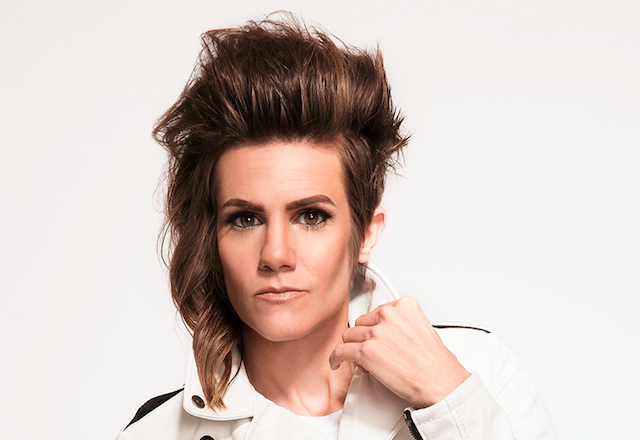Though she left the city for Los Angeles in 2012, Cameron Esposito holds a sweet spot for Chicago. Born and raised in suburban Western Springs, the comedian launched her career here in the mid-aughts, and even met her wife, stand-up Rhea Butcher, in the hallowed halls of Cole’s Bar.
Now, fresh off season two of Esposito's TV series Take My Wife—picked up by Starz after its previous home, NBC streaming service Seeso, shut down—she returns to Chicago for a week-long residency at the Den Theatre. Running March 22 through April 1 and billed as Cameron Esposito’s Top Secret Public Experiment, the shows, where Esposito will test out new material, are sold out online. But she's reserved a slew of first-come, first-served tickets for the door, and hints that more shows could be added.
Ahead of the performances, Esposito chatted about the appeal of a Chicago audience, promoting diversity in television, and the path she’s carving for a younger generation of queer artists.
Why did you decide to do this run at the Den Theatre?
I'm working on a new hour of stand-up that is really personal. I didn’t want to go on a big nationwide tour and play huge theaters—I wanted to work it out in very small spaces first. Obviously Chicago is where I’m from, where I got my start. I love the crowds there, so I thought, what if I just used the model an off-Broadway show does—where you’re just in a theater having a little residency?
What about Chicago audiences makes this the place to try new material?
Chicago has some of the best performing arts audiences in the country—especially if you’re asking people to come out on a Tuesday. I don’t know whether it’s a function of the weather or bar culture or a Midwestern can-do spirit, but you can get folks to come out and participate in art seven days a week, 365. I remember during the Snowpocalypse I canceled on a show because it was downtown and I lived in Logan Square. The organizers were like, “Alright, I guess, if you have to, we’re still going to do the show.” Literally the schools were shut down, the buses weren’t running, but still [art] continues. If you want to go somewhere and do 14 shows, go to Chicago.
What made you want to work on more personal material?
Over the duration of my career, what queerness means has really changed. Especially in a place like Chicago, with a history of segregation, young people are a lot more mixed on a lot of different vectors: race, sexuality, gender identity. I came up in mainstream rooms when mainstream meant “not gay” and gay meant “not mainstream.” Now that’s different, and everything’s blurred together, so I’m interested in expanding what I talk about.
What was it like to see so many different kinds of people respond to your TV show, Take My Wife?
The first season was a big surprise, because at the time we were part of a brand-new streaming service, our budget was small, and we just wanted to learn how to do it. We wanted to make something that felt very true and hadn’t been made before—because it stars two out, queer people. Those things had never existed before: an established queer couple at the center of a show being created and played by queer actors.
Our goal was also to have it be specific in content but sitcom-y in tone. It's Lucy and Ricky, only they’re dealing with somebody saying a gay slur. Because that was received so well, we got a bigger budget for season two, which we spent on diversifying our cast and crew. We did the casting ourselves; our cast was over 50 percent queer.
Then Seeso went under. What felt especially sad about it not being released was we had proven this model and nobody got to see it. We want to promote folks buying the show because it proves to the industry that there’s a demand for shows focused on queer characters and shows that take diversity seriously.
A lot of recent shows about stand-up feature actors telling jokes written by a room of writers. Seeing real stand-ups do their own material in Take My Wife makes it feel so much more authentic, and really highlights the work of different comedians.
We were deliberate about who we gave power to in the stand-up community. There’s a character named Dave who’s played by an awesome actor, Zeke Nicholson. He’s actually the only person who does stand-up on the show who’s not a stand-up—he's an improviser. There’s a moment where he's really excited to meet an established comic for the first time, and the person we cast as that established stand-up is Jen Kirkman. So it’s a person of color looking up to a white woman, and she’s being cool to him and he’s being deferential to her, and they’re both people who we don’t see doing stand-up on TV very often. We really wanted a woman to be in a position of having more experience than a dude because that’s something that both Rhea and I have happen to us.
You and Rhea have become idols to the young queer community. How does it feel to have that influence on the next generation?
The whole reason I started doing stand-up was to create a safer world for myself, where I was just honest about who I was. I was looking people in the eye and telling them I was gay and making them laugh so they wouldn’t kill me. I’m a future-motivated person. I’m always looking to the next thing, and I’m always working really hard, so you don’t realize that you’ve created change. If in some small way I have and I hear from people I have, that’s amazing. On the inside, it doesn’t always feel true, but that was the goal.



